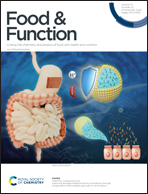Walnut protein hydrolysates ameliorate alcohol-induced cognitive impairment (AICI) by alleviating oxidative stress and inflammation in the brain and improving hippocampal synaptic plasticity in Sprague–Dawley rats†
Abstract
Alcohol-induced cognitive impairment (AICI) has become a public health concern and thus effective intervention is urgently needed. The present study aims to assess the amelioration effect of walnut protein hydrolysate (WPH) in AICI rats and elucidate the associated mechanism. The Morris water maze task verified the significant amelioration effect of WPH against learning and memory deficits. Moreover, a reduction of oxidative stress and inflammation in brain tissues was observed and the significant enhancement of brain-derived neurotrophic factor (BDNF), postsynaptic density protein (PSD95) and cAMP-response element binding protein (p-CREB) expression (P < 0.05) indicated the rescue of damaged hippocampal synaptic plasticity. In addition, after WPH administration, disorders of ERK and caspase-3 signal pathways, abnormality in the release of the neurotransmitters acetylcholine (ACh) and gamma-aminobutyric acid (GABA), and histopathological impairment in the hippocampus of AICI rats were ameliorated in a dose-dependent manner. Overall, the amelioration of AICI by WPH might result from the alleviation of oxidative stress and inflammation in brain tissue and the improvement of hippocampal synaptic plasticity.



 Please wait while we load your content...
Please wait while we load your content...